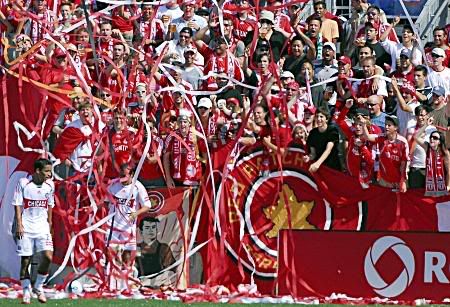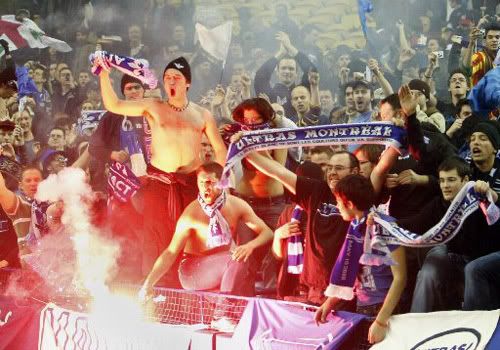 If you're a casual sports fan you may not be aware that the North American sports world is in the midst of a long-standing, ever-mutating battle between traditional "American" sports and soccer. This battle involves fans, owners and media, and it happens on both a conscious and sub-conscious level. The battle is the following; how to resist the growth of the world's most popular sports in its final holdout region, USA and Canada.
If you're a casual sports fan you may not be aware that the North American sports world is in the midst of a long-standing, ever-mutating battle between traditional "American" sports and soccer. This battle involves fans, owners and media, and it happens on both a conscious and sub-conscious level. The battle is the following; how to resist the growth of the world's most popular sports in its final holdout region, USA and Canada.Despite a few blips, the Forces of Resistance have always had the upper hand on the Knights of Footy, thanks to an entrenched anti-soccer media. In the late 70's the NASL took North America by storm with the arrival of Pelé, who signed to play for the New York Cosmos. It was an explosion that couldn't be sustained. As soon as Pelé was gone the sport imploded for a multitude of reasons (I suggest watching Once In A Lifetime as an educational tool), sending it into a dark place where it remained for a few more decades. At the time, critics of the sport cited its un-American slant, and even went as far as to call it the sport of Communists (ah, the Cold War, how we miss you!).
 When the US successfully bid on hosting the 1994 World Cup, FIFA forced a concession from the organizing committee; America would have to establish its own national soccer league. Major League Soccer was born, and this time the people put in charge did it the right way. They fostered a slow growth of the league, waiting until markets developed and genuine demand presented itself for expansion. The seed was planted. Now the naysayers claimed that a National league could never work, people didn't want the product shoved down their throats, the NASL proved that soccer could not sustain itself. Note the escalation in sophistication and volume of the arguments.
When the US successfully bid on hosting the 1994 World Cup, FIFA forced a concession from the organizing committee; America would have to establish its own national soccer league. Major League Soccer was born, and this time the people put in charge did it the right way. They fostered a slow growth of the league, waiting until markets developed and genuine demand presented itself for expansion. The seed was planted. Now the naysayers claimed that a National league could never work, people didn't want the product shoved down their throats, the NASL proved that soccer could not sustain itself. Note the escalation in sophistication and volume of the arguments.The success of the 1994 World Cup took many by surprise, and introduced many more to the beautiful game (including yours truly who was 18 at the time). Networks began to take note and began buying rights to broadcast matches from the best leagues in Europe. As more and more people grew interested in the game, resistance grew ever more feverish. The arguments of the time were that this was a sport for sissies, divers, immigrants, it was boring, there was no action. Media types began writing columns dismissing the sport, claiming to not "get" what the fuss was about, all a flash in the pan.
With more cable licences being awarded, and more and more sports channels becoming available, soccer continued to grow. Here in Canada, Sportsnet (first CTV, then Rogers) began pushing soccer in a major way, by signing an exclusivity contract with the Canadian Soccer Association to carry all national team games but more importantly, carrying several English Premiership matches every week. People around me, knowing I was a fan of the sport, started asking more and more pertinent questions about it: "How does it work?", "What is relegation?", "Why is Owen Hargreaves not playing for Canada?", etc. I even wrote a column on the Voyageurs website to give lovers of the sport a bit of ammunition against the multiplying howls of fury at the sport's growth.
Apparently the reporters being asked to cover soccer were not happy about it, and this translated to numerous sports personalities taking shots at the sport. I'll never forget the play-by-play voice of the Ottawa Senators, Dean Brown, on a CBC panel with the Ottawa Citizen's Wayne Scanlan debating the popularity of the sport and its potential in Canada. This was on the eve of the 2002 World Cup. Brown completely ripped soccer and the people who love it, such a vociferous, unwarranted attack that I will never forgive him for it. It was low-brow stuff, the typical macho, hockey-is-king bullshit. There was something about soccer that made these people's blood boil; even having to talk about it seemed like an insult to their manhood and fighting words would fly.
 Seven years on, soccer's made some incredible strides. The signs are everywhere: Toronto FC selling out every home game they've ever played, Vancouver being awarded an MLS expansion franchise for 2011, Montreal and Ottawa practically begging for a franchise, 55,000+ at Olympic Stadium for a CONCACAF Champions League match, no less than three cable channels dedicated to soccer, UEFA Champions League matches every week on TSN, Premiership on Sportsnet and The Score. On Sunday night, I noticed something incredible during the broadcast of the Braves-Phillies MLB season kickoff; on the news crawler at the bottom of the screen, alongside fellow categories "MLB", "NBA", "NHL" and "NCAA" were "MLS" and "Soccer". When soccer's turn was up, scores from the English, Italian, Spanish and Mexican leagues flashed across the screen. I smiled. When the "Worldwide Leader" deems you worthy of real estate on its crawler, you've officially arrived.
Seven years on, soccer's made some incredible strides. The signs are everywhere: Toronto FC selling out every home game they've ever played, Vancouver being awarded an MLS expansion franchise for 2011, Montreal and Ottawa practically begging for a franchise, 55,000+ at Olympic Stadium for a CONCACAF Champions League match, no less than three cable channels dedicated to soccer, UEFA Champions League matches every week on TSN, Premiership on Sportsnet and The Score. On Sunday night, I noticed something incredible during the broadcast of the Braves-Phillies MLB season kickoff; on the news crawler at the bottom of the screen, alongside fellow categories "MLB", "NBA", "NHL" and "NCAA" were "MLS" and "Soccer". When soccer's turn was up, scores from the English, Italian, Spanish and Mexican leagues flashed across the screen. I smiled. When the "Worldwide Leader" deems you worthy of real estate on its crawler, you've officially arrived.And now we've come to the reason for this random defence of soccer, and more specifically its passionate fans. Over the last few weeks I've been reading and hearing many of the Forces of Resistance, in its death throes, argue that the fans of soccer who attend games are indeed poseurs, fakes, guilty of fabricated enthusiasm. When I hear this, I know the Knights of Footy have won. If your argument, your last stand against the invasion, is that the emotion and passion you witness is somehow "fake", it might be better to just sulk as you cry into your beverage. You've failed to get on board, you've erred in your assessment of the qualities of the sport, you are immune to the contagious quality of fan pro-activity. For what you deem "fabricated enthusiasm" is really proactive engagement from fans. Those passionate people you see on television supporting Toronto FC? They've met beforehand, they congregate on the internet, they invent chants, they create banners, they come to the stadium prepared to lift their team without the need for permission from jumbotron prompts. They have songs for individual players, individual occurrences, and they intimidate opposition players.
 Soccer has arrived, and is here to stay. The media has finally evolved into embracing the sport. More and more news organizations, both online and traditional, have a soccer columnist on staff. Soccer highlights take up more and more time on sports news shows. The debate is no longer "can soccer catch on in Canada?", it is "how big will it get?". You think there's a lot of coverage now? Just wait until Canada's Mens National Team finally qualifies for the World Cup - only 5 years to Brazil 2014!
Soccer has arrived, and is here to stay. The media has finally evolved into embracing the sport. More and more news organizations, both online and traditional, have a soccer columnist on staff. Soccer highlights take up more and more time on sports news shows. The debate is no longer "can soccer catch on in Canada?", it is "how big will it get?". You think there's a lot of coverage now? Just wait until Canada's Mens National Team finally qualifies for the World Cup - only 5 years to Brazil 2014!How long before the Forces of Resistance play their last card and start branding us all hooligans? Or has that already started?
2 comments:
Geez, I had a nice long-winded comment to make, but all I have now that I've reached the end of your post are 2 words:
Go Brazil! :)
vote for Brazil
http://www.the-soccer.com/brazil-soccer.html
Post a Comment